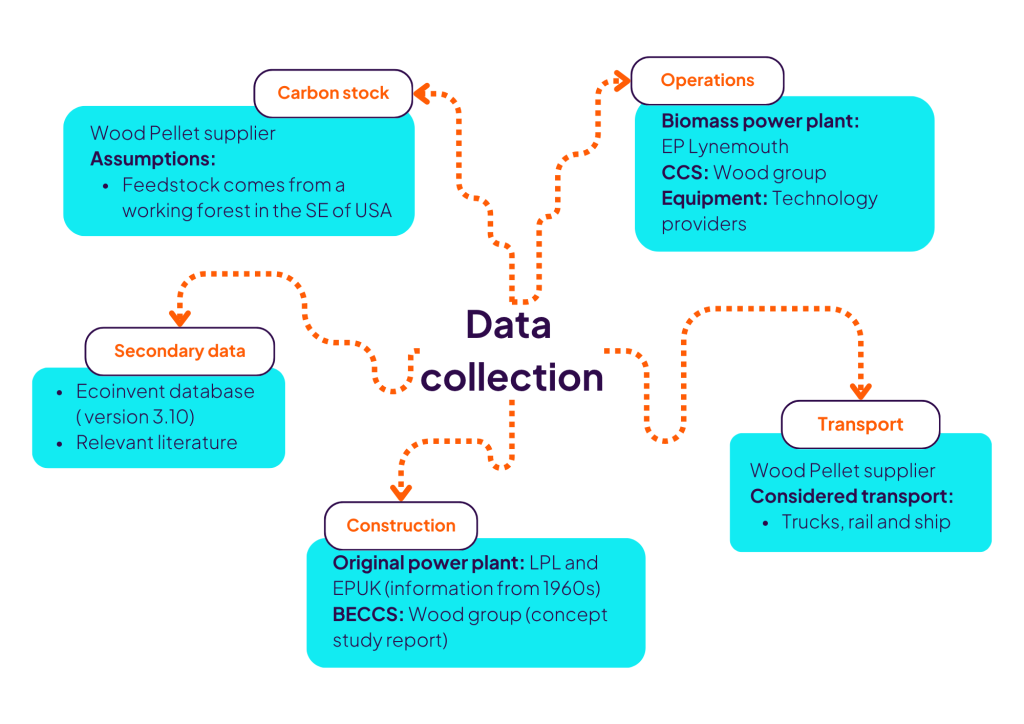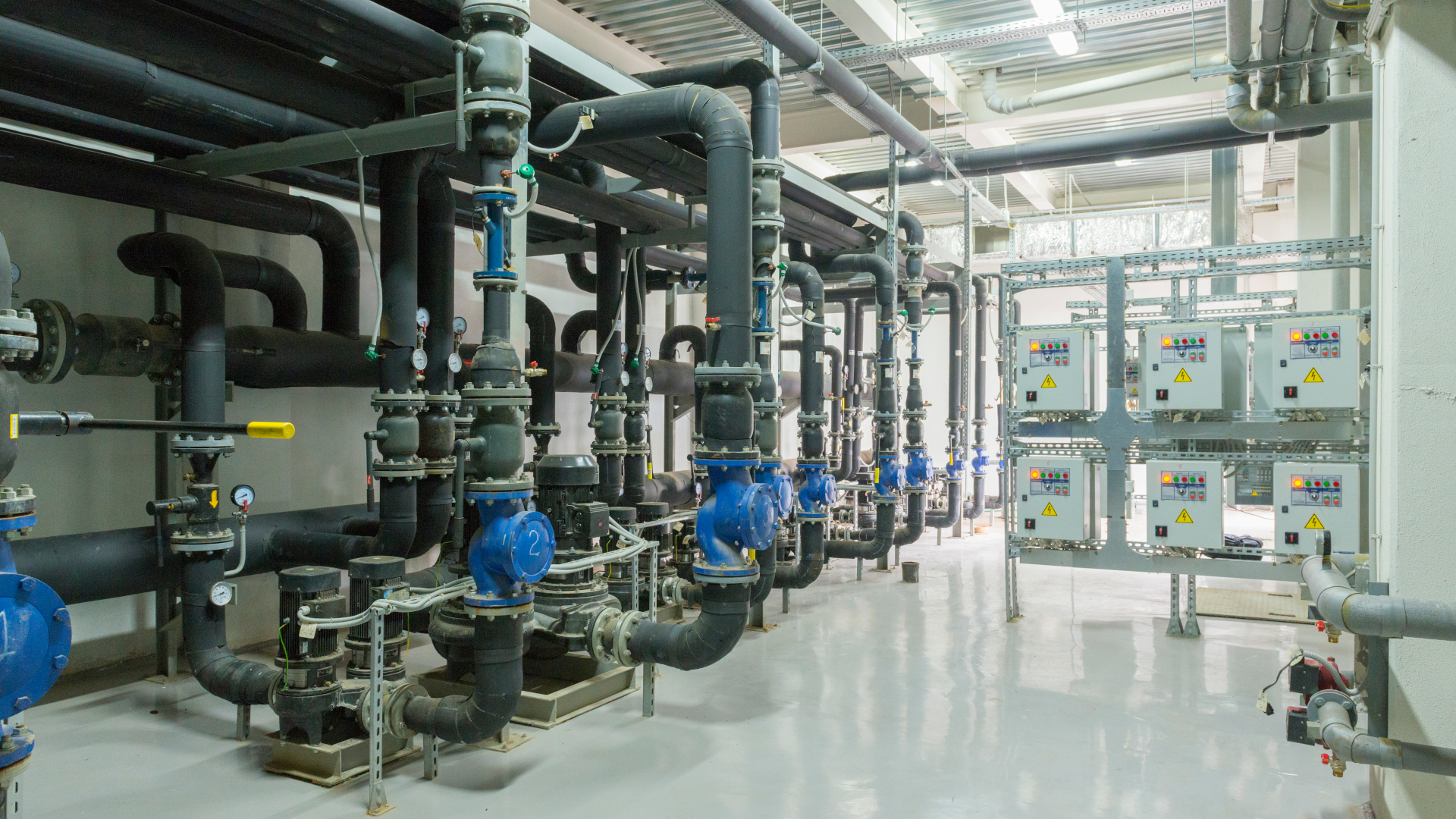Project Background
Decerna was commissioned by EP UK Investments Ltd (EPUKI) to conduct a detailed Life Cycle Assessment (LCA) of the proposed Bioenergy with Carbon Capture and Storage (BECCS) retrofit at Lynemouth Power Station in Northumberland, UK. The assessment aimed to evaluate the potential climate change mitigation benefits and broader environmental impacts of the BECCS system over its entire lifecycle. This project formed a crucial part of EPUK’s application for the Track 1 Extension for Carbon Capture and Storage (CCS) projects, supporting the UK’s transition towards net-zero emissions.
Our team at Decerna applied a rigorous and transparent methodology, following ISO 14040 and ISO 14044, as well as the EU Commission’s LCA4CCU guidelines. Our study followed a cradle-to-storage system boundary encompassing:
- Feedstock supply chain (cultivation, residue recovery, pelletisation, and transportation of biomass)
- Power generation operations
- Carbon capture processes
- CO₂ transport and storage infrastructure
- Construction and decommissioning of all relevant facilities
Data Sources and Modelling
The Decerna team gathered data from multiple sources, combining primary data from EP Lynemouth Power and key project stakeholders including Wood Group, with detailed information from Lynemouth’s current major supplier regarding pellet mills, feedstock origin and transportation routes. This was supplemented with secondary data from the Ecoinvent database (version 3.10), as well as literature reviews and input from industry experts. The study concluded that, subject to certain key assumptions including that Lynemouth continues to source only sustainably sourced biomass, the BECCS retrofit at Lynemouth could contribute net-negative emission of -1,017 kg CO₂e/MWh (-2.25 MPTA CO2e).

Building on this data foundation, we developed a detailed parameter-based openLCA model. At Decerna we use openLCA for all LCA projects because of its adaptability, and for future alignment with other methods, such as for the US 45Q tax credit.
The model covered:
- Full operation of the biomass sourcing
- Transportation across different modes and routes
- Construction of the original power station
- Construction of the BECCS retrofit
- Decommissioning of the site
- Operational modelling for the energy generation and carbon capture
- Pipelines to the eventual storage sites.
Impacts were measured against the standard GWP100, as well as GWP20, which ensures that short-term warming impacts are not missed. Uncertainty analysis was undertaken using a pedigree matrix approach, with major sources of climate impacts identified via sensitivity analysis. The model can also assess a full suite of environmental impacts beyond climate change.
Key Findings
The work showed the proposed BECCS retrofit has the potential to achieve substantial negative greenhouse gas emissions. However, this performance depends on three critical factors identified through the analysis. First, the sustainability of biomass sourced from managed forestry and processing residues, second, the efficiency of the carbon capture system, and third, the permanent storage of captured CO₂.
In terms of biomass sourcing, Lynemouth’s fully audited supply chain utilises wood pellets from managed forests which are certified by independent expert bodies on their feedstock usage, including the use of only low-value thinnings, low-grade stem wood, mill residues, and secondary wood materials. The sustainability of this is absolutely vital; if this had come from unverified forestry sources or supply chains, then the system would not be carbon negative.
Conclusion
This LCA demonstrates that the Lynemouth BECCS project can achieve substantial negative emissions, based on its verified sustainable biomass sourcing and the technology chosen for its capture systems. The methodology is transferable to other BECCS projects, but the results are specific to Lynemouth’s supply chains, as each BECCS project’s environmental performance depends on actual biomass sourcing practices, transportation distances, and operational parameters, not system design alone.
This project demonstrates how LCA validates whether emerging technologies deliver genuine environmental benefits. The Lynemouth study provided quantitative evidence for regulatory submission, identified operational priorities for maximising negative emissions, and established verification standards for sustainable biomass sourcing.
Decerna undertakes LCA for carbon capture due diligence across multiple projects. Our results inform government policy, investment decisions, and technology development.
Need LCA, EPD, or CBAM consultancy?
Or have a research proposal to collaborate on?
Global commercial consultancy • Horizon Europe, UKRI & Innovate UK research partner
Our newsletter
For regular updates on our activities, please sign up to our mailing list





